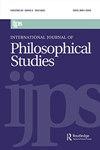Addressing the Past: Time, Blame and Guilt
IF 0.6
3区 哲学
0 PHILOSOPHY
INTERNATIONAL JOURNAL OF PHILOSOPHICAL STUDIES
Pub Date : 2022-05-27
DOI:10.1080/09672559.2022.2121890
引用次数: 0
Abstract
ABSTRACT Time passed after the commission of a wrong can affect how we respond to its agent now. Specifically it can introduce certain forms of complexity or ambivalence into our blaming responses. This paper considers how and why time might matter in this way. I illustrate the phenomenon by looking at a recent real-life example, surveying some responses to the case and identifying the relevant forms of ambivalence. I then consider a recent account of blameworthiness and its development over time that purports to account for this ambivalence. Blameworthiness, on this account, consists in a psychological flaw; time matters because it brings the possibility of change in the agent, and ambivalence arises because it is hard to know to the extent of such change. This account, I argue, mischaracterises responses to the case and misidentifies the source of their ambivalence. Drawing on recent work in the philosophy of emotion, I sketch an alternative approach. Our responses, I suggest, make sense within processes through which we address wrongdoing. Time matters because these processes take time and because time’s having passed raises the question whether and how the wrong has been addressed. Unaddressed wrongs can elicit ambivalence of a specific form.应对过去:时间、责备和内疚
摘要:犯下错误后经过的时间可能会影响我们现在对其代理人的反应。具体来说,它会在我们的指责反应中引入某些形式的复杂性或矛盾心理。本文考虑了时间如何以及为什么会以这种方式起作用。我通过观察最近的一个现实生活中的例子来说明这一现象,调查对该案件的一些反应,并确定相关的矛盾心理形式。然后,我考虑了最近关于应受谴责性及其随着时间的发展的描述,这似乎是这种矛盾心理的原因。因此,应受谴责的心理缺陷;时间之所以重要,是因为它给代理人带来了改变的可能性,而矛盾心理的产生是因为很难知道这种改变的程度。我认为,这种描述错误地描述了对案件的反应,并错误地确定了他们矛盾心理的来源。根据最近在情感哲学方面的工作,我勾勒出了另一种方法。我认为,我们的回应在我们处理不当行为的过程中是有意义的。时间很重要,因为这些过程需要时间,而且时间的流逝引发了一个问题,即是否以及如何解决错误。未解决的错误会引发特定形式的矛盾心理。
本文章由计算机程序翻译,如有差异,请以英文原文为准。
求助全文
约1分钟内获得全文
求助全文
来源期刊

INTERNATIONAL JOURNAL OF PHILOSOPHICAL STUDIES
PHILOSOPHY-
CiteScore
0.90
自引率
0.00%
发文量
29
期刊介绍:
The International Journal of Philosophical Studies (IJPS) publishes academic articles of the highest quality from both analytic and continental traditions and provides a forum for publishing on a broader range of issues than is currently available in philosophical journals. IJPS also publishes annual special issues devoted to key thematic areas or to critical engagements with contemporary philosophers of note. Through its Discussion section, it provides a lively forum for exchange of ideas and encourages dialogue and mutual comprehension across all philosophical traditions. The journal also contains an extensive book review section, including occasional book symposia. It also provides Critical Notices which review major books or themes in depth.
 求助内容:
求助内容: 应助结果提醒方式:
应助结果提醒方式:


